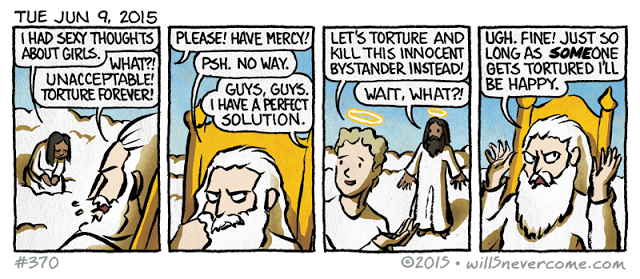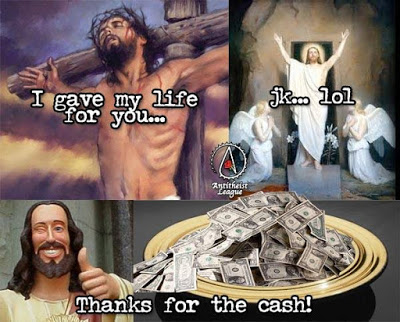“Not My Will, But Thine, Be Done”
Matthew 26:36–46; Mark 14:32–42; Luke 22:39–46
LDS manual: here
Purpose
To explain that the concept of the Atonement makes no sense and is immoral.
Reading
Jesus is about to be captured, so he heads to the Garden of Gethsemane with his disciples. They fall asleep, but Jesus can’t bear to wake them because they’re so cute when they’re sleeping like that! But it’s Atonement time, so Jesus knows it’s time to…
Apparently, in a way that’s so amazing that we humans can’t possibly understand it, Jesus suffered for a while, and this meant that everyone’s sin was paid for. It was an infinite atonement and an infinite sacrifice; it stretched forward and backwards in time to pay for all the sins of — not just every human who ever lived or will live — but it also paid for the sins of everyone on all the planets in all the solar systems in all the galaxies in the universe.
It sounds like the whole process took about an hour.
Main ideas for this lesson
Jesus tries to pike out
Jesus falls on his face and prays, asking if the whole torture-and-death thing is really necessary.
Matthew 26:39 And he went a little farther, and fell on his face, and prayed, saying, O my Father, if it be possible, let this cup pass from me: nevertheless not as I will, but as thou wilt.
This one’s for all the trinitarians.
Actually, Jesus’ question was a pretty good one. Why was Jesus’ torture and death necessary?
Let’s take that up in a minute. But first, blood.
Blood from every pore?
There’s a rather ambiguous simile here in Luke. Sweat, or blood?
Luke 22:44 And being in an agony he prayed more earnestly: and his sweat was as it were great drops of blood falling down to the ground.
Mormons have taken the blood idea and run with it. In particular, the D&C takes the “blood from every pore” idea very seriously.
D&C 19:18 Which suffering caused myself, even God, the greatest of all, to tremble because of pain, and to bleed at every pore, and to suffer both body and spirit—and would that I might not drink the bitter cup, and shrink—
Well, this verse seems to have been a later addition. It doesn’t appear in early versions of Luke. Kyroot explains the implications in reason 171.
These verses do not appear in the oldest manuscripts of Luke and are clearly a later addition. This presents two problems. First, it is another example of tampering with the scriptures, one that was detected only because it occurred later than the dates of the earliest manuscripts. Keep in mind that there is a sizable time gap between the original manuscripts and the oldest ones that have been recovered, so many other examples of scripture tampering may exist but cannot be identified at this time.
Second, it presents an unlikely scenario, for if Jesus was fully divine, he would have known all that was about to happen, would be prepared for it, and would therefore not be in a mental state of agony requiring assistance from an angel.
Problems with the Atonement
The story of Jesus having to suffer and die so everyone could be forgiven of sins has been around for a long time. We’ve all heard about it so often that we hardly think about it.
Once you do think about it, however, the incoherence becomes obvious. And there are so many ways that this story fails to hold together that I’ve made a rather long list.
There are other lists out there — a similar one is at Patheos — but here’s mine.
The suffering was unnecessary
Why didn’t God just forgive everyone? He could have.
The idea comes up in this early episode of Mr Deity:
Instead, he decided to have his son tortured and murdered so he could feel okay about having a relationship with us again. Isn’t that a bit strange?
There have been some attempts to answer this, and the responses center around God’s fairness and sense of justice. Simply forgiving everyone would have short-circuited God’s sense of justice — and yet, strangely, punishing some other guy and then forgiving everyone was totes okay.
These responses can be dealt with very simply. Just keep asking this question: Was it possible for God to find a way to forgive everyone in a way that
- didn’t violate God’s sense of justice?
- didn’t upset God’s sense of equilibrium?
- didn’t involve Jesus’ torture and death?
If so, why didn’t he? And if not, then he’s not all-powerful.
Another line of explanation says that God had to have Jesus tortured and killed because doing so fulfilled some greater “principle”, and this principle could not have been fulfilled in any other way.
If that’s the case, then why worship God? Again, he’s not all powerful, since there are principles that are more all-mighty than he is. Why not just worship the “principles”, since God is clearly subordinate to them?
The nature of the “debt” is never explained
What exactly is this debt? People keep describing this in terms of “Jesus paying the debt for sin” or “paying the price for sin”.
From the LDS manual:
Elder Marion G. Romney: He paid the debt for your personal sins and for the personal sins of every living soul that ever dwelt upon the earth or that ever will dwell in mortality upon the earth.
And so it’s very common for Mormons to use a monetary metaphor. Here’s the one suggested by the LDS manual.
Boyd Packer’s story: “The Mediator”
Elder Boyd K. Packer used a parable to teach about how the Atonement of Jesus Christ frees us from sin as we repent and obey the commandments. You may want to share this parable to help class members understand the need for the Atonement.
A bit of background: The late Boyd Packer was the church’s foremost homophobe. He inveighed against threats to the church, notably feminists, homosexuals, and “so-called scholars or intellectuals”. He was in church leadership for 50 years, and during that time fostered the kind of anti-gay climate that doubtless led to the suicides of numerous LGBT Mormon kids. He decried “Satan and his substitute counterfeits for marriage”, and denied that homosexuality was preset, saying, “Not so! Why would our Heavenly Father do that to anyone? Remember, he is our father.”
Upon his death, the world instantly became a better place.
Anyway, if somehow you’re unfamiliar with the “mediator” analogy, here’s the video.
Or you don’t like being bored and lied to, here’s the short version.
- Person A incurs a debt to Person B, and can’t repay it.
- Person B threatens to throw person A into prison.
- Person C steps in, pays the debt, and allows Person A to repay on more manageable terms.
Ask: In this metaphor, who are Persons A, B, and C?
Answer: A and C are a snap. Person A is all of us, and Person C is Jesus.
But what often gets glossed over is the identity of Person B. Who is it?
It can’t reasonably be anyone other than God. So now we have a situation where God wants to throw you in prison, and Jesus intervenes. But Jesus and God are supposed to be on the same side. Instead, they’re playing good cop / bad cop. Why the games? This situation, which we all seem to have been railroaded into at birth, is a set-up.
Ransom
Jesus’ sacrifice is described as a “ransom”. From Joseph Smith, via President Newsroom:
The glorious news, the glad tidings is that Christ our Lord has come to earth, offered Himself as a ransom from sin and made available deliverance from death and hell.
A ransom to whom? Who is demanding this sacrifice? Again, if God is in control here and set up this system, as believers claim, then God is in the role of a kidnapper. I don’t want to worship a kidnapper.
And another similar point: when you pay a ransom, you don’t get the money back. The kidnapper keeps it. Kyroot again (point 63):
The central concept of Christianity is that Jesus died on the cross as a final sacrifice to allow his followers to receive it vicariously and thus be washed of sin for entry into heaven.
But whereas a sacrifice means losing something permanently, Jesus lost nothing. He came back three days later good as new. So, in effect, there was no sacrifice.
The foreknowledge of Jesus is another problem. There he was, telling everyone how his body would be destroyed, and he would rise again in three days. If he knew that he was going to suffer for a few hours, be dead for a weekend, and then become a god and sit at the right hand of the father for eternity, then the whole proposition begins to look less like a sacrifice and more of a career move.
Many people suffer intense pain for a lot longer than Jesus reportedly did. Pseople with cancer or AIDS suffer for months and months; Jesus just had a rough couple of days.
Nothing more should be required
If God demanded a sacrifice and got it, then why should anything more be required of me, like belief or obedience? God’s got the sacrifice he wanted, and we’re done.
When I pay off a debt (say, a mortgage), then my obligation to the bank is over when the money is paid, and there’s nothing more for me to do. The bank doesn’t demand that I “believe” in it or “accept” it into my heart.
In short, the sin-debt metaphor maks no sense. It makes me wonder if people who use this metaphor even understand the idea of ‘money’.
We “can’t understand”
When I point out these inconsistencies, believers respond that the workings of this are somehow “incomprehensible”. They respond that we can’t “understand” it.
Elder James E. Talmage taught: “Christ’s agony in the garden is unfathomable by the finite mind, both as to intensity and cause. . . . He struggled and groaned under a burden such as no other being who has lived on earth might even conceive as possible. It was not physical pain, nor mental anguish alone, that caused him to suffer such torture as to produce an extrusion of blood from every pore; but a spiritual agony of soul such as only God was capable of experiencing. . . . In that hour of anguish Christ met and overcame all the horrors that Satan, ‘the prince of this world,’ could inflict. . . . In some manner, actual and terribly real though to man incomprehensible, the Savior took upon Himself the burden of the sins of mankind from Adam to the end of the world” ( Jesus the Christ, 3rd ed. [1916], 613).
Now this is not quite right. This is the central tenet of Christianity, so if any element of Christian doctrine should be well-understood, this should be it. Yet even professional Christianity explainers can’t explain it satisfactorily, often kicking the can down the road and saying that we’ll understand it “someday”.
If it can’t be understood, fine. It can’t be understood. So don’t keep telling it to others like you do understand it.
These are the kinds of things that believers never seem to think through. It makes no sense, but they don’t seem to notice.
Vicarious suffering for sin is immoral
Sacrificing oneself for someone else is a very common theme in literature. It shows up in everything from A Tale of Two Cities to Frozen.
That’s one thing. But in Christianity, this idea of making an innocent scapegoat pay for the consequences of your actions is a massive evasion of responsibility.
What must go through a believer’s mind? “I can avoid the consequences of my actions by having some innocent guy get tortured? Sign me up!”
I’ll take your place on the scaffold, but I can’t take away your responsibilities. I can’t forgive what you did, I can’t say you didn’t do it, I can’t make you washed clean. The name for that in primitive middle eastern society was “scapegoating.” You pile the sins of the tribe on a goat, you drive that goat into the desert to die of thirst and hunger. And you think you’ve taken away the sins of the tribe. This is a positively immoral doctrine that abolishes the concept of personal responsibility on which all ethics and all morality must depend.
For that matter, when in the world has human sacrifice ever been a solution for anything? Hitchens again:
You said in a debate with Richard Dawkins, I have it down, you said that the great thing about God is He knows what it’s like to lose a son. Now I want you ladies and gentlemen to ponder that expression for just a moment. First, it’s self-evidently—if the story is true, which I don’t think it is—it’s self-evidently not the case, even in the narrative. He doesn’t lose a son, He lends one. He doesn’t offer one because no one’s demanded it. There’s no problem that has so far been identified in the human species that demands a human sacrifice. For what problem, for what ill is this a cure? There’s no argument, there’s no evidence that there is. No, it’s imposed upon you. I’m doing this because the prophets said I would and I’m going to have the boy tortured to death in public to fulfill ancient screeds of Bronze Age Judaism. But wait, I don’t want it. I don’t need it. I don’t feel better for it. I feel very uneasy about it. Well that’s a pity, because then you’re going to be cast into eternal fire. This is no way to talk. I don’t like to be addressed in that tone of voice.
The idea of the Atonement — putting our sins onto a scapegoat — makes absolutely no sense, even on its own terms. The story doesn’t hold together on any level. It does, however, make a lot of sense in terms of cultural evolution. For someone who’s in a culture that accepts the idea of animal sacrifice, the sacrifice of God’s son would be a natural extension of the idea.
Thankfully, we do not live in such a culture. I do not accept that human sacrifice is moral, and I don’t accept that I must become complicit in the torture and death of an innocent person to become cleansed of my imperfections.










29 July 2015 at 4:09 pm
Wait, Boyd K Packer is dead? How did I not hear about this?
30 July 2015 at 11:19 am
How DID you not hear about this?